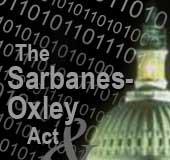 MF Global could finally help the Sarbanes-Oxley Act prove itself. The reform inspired by Enron, WorldCom and other accounting scandals helped clean up U.S. company books, albeit at a cost. But approaching 10 years on, enforcers have filed few cases under the law. They could finally get their big chance if questions surrounding MF Global’s failure prove to have substance.
MF Global could finally help the Sarbanes-Oxley Act prove itself. The reform inspired by Enron, WorldCom and other accounting scandals helped clean up U.S. company books, albeit at a cost. But approaching 10 years on, enforcers have filed few cases under the law. They could finally get their big chance if questions surrounding MF Global’s failure prove to have substance.SarbOx has always drawn gripes. A 2009 survey by the U.S. Securities and Exchange Commission pegged the average company’s cost of complying with the 2002 law at $2.3 million a year. Some firms complained that it deterred them from going public and drove business overseas. More recent research, in contrast, credits it for better disclosure, fewer financial restatements and a lower cost of capital for companies.
See full Article.








